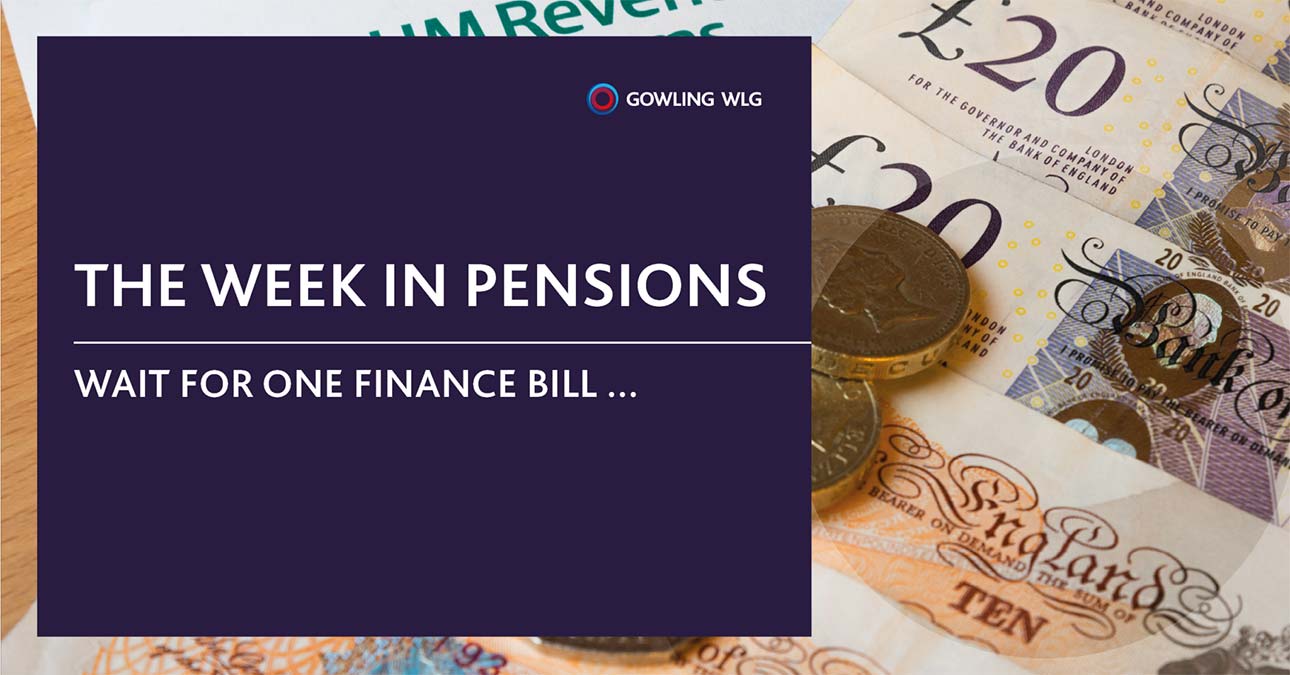In The Week In Pensions this week:
- the Finance Bill 2019 – 21 receives Royal Assent;
- the Finance Bill 2020 – 21 is introduced;
- tax relief on members’ pension scheme contributions is the subject of a call for evidence from HM Treasury ; and
- amending regulations extend scope of PPF creditor rights under the Corporate Insolvency and Governance Act 2020.
And, in our highlights from the pensions industry and national press:
- Small pension pots put automatic enrolment success at risk; and
- Higher earners at risk of losing automatic pension tax relief.
Watch the video update
Pensions legal and regulatory developments
Finance Bill 2019 – 21 receives Royal Assent
The Finance Bill 2019-2021 received Royal Assent on 22 July 2020 and became the Finance Act 2020. The Act largely legislates for the March 2020 Budget announcements. For pensions, this includes the increase to the main thresholds for the tapered annual allowance (by £90,000) and the reduction in the minimum annual allowance from £10,000 to £4,000, all with effect from the 2020/2021 tax year. In addition, it also includes provisions to prevent people returning to work to help with the COVID-19 response from losing any protected pension age.
Finance Bill 2020-2021 introduced
On 21 July 2020, the government introduced the Finance Bill 2020-21. For pensions, the Bill includes provisions on the tax treatment of collective money purchase schemes which are expected to be introduced by the Pension Schemes Bill 2019-21.
The provisions will amend the Finance Act 2004 to allow collective money purchase schemes to operate as UK-registered pension schemes, so that they can benefit from the same tax treatment as existing UK-registered pension schemes. The changes are intended to take effect from 6 April 2021. HMRC has published an accompanying policy paper (see link below).
- Click here for the Finance Bill 2020 – 2021’s collective money purchase schemes provisions
- Click here for HMRC’s policy paper on collective money purchase benefits
Spring Budget 2020—tax relief on members’ pension scheme contributions
On 21 July 2020, HM Treasury published its “Pensions tax relief administration: Call for Evidence”. The call for evidence seeks to gather evidence on the operation of the two main methods of administering pensions tax relief, namely:
- net pay arrangements (where an individual receives tax relief when pension contributions are taken out of their pay by their employer before tax is calculated); and
- relief at source (where a pension scheme claims tax relief at the relevant basic rate from HMRC because individuals make pension contributions out of their earnings after tax has been calculated. Individuals who pay tax at rates higher than the basic rate can claim any extra relief directly from HMRC).
This consultation was announced in the Chancellor’s Budget on 11 March this year and has come about because of concerns that a low earning individual’s take-home pay could be affected by the method of pensions tax relief operated by the pension scheme that their employer has chosen. The consultation is asking for views on what changes can be made to the existing administrative processes to improve outcomes.
Note that the government is not proposing to implement an entirely new method of administering pensions tax relief but rather wants to understand any potential new approaches to providing pensions tax relief within the current framework. Any changes to the pensions tax relief system will be assessed against the three principles of simplicity, deliverability and proportionality.
Also note that the call for evidence is focused on pensions tax relief administration only. The consultation states that the government considered the possibility of reforming pensions tax relief in the 2015 consultation ‘Strengthening the incentive to save: a consultation on pensions tax relief’. Responses to this consultation “provided no consensus for change” and so at the 2016 Budget the government announced that it would not be making fundamental reform to the pensions tax relief system. This call for evidence, therefore, does not cover the marginal rate relief structure of pensions tax relief, nor does it cover issues around the limits on pensions tax relief.
The call for evidence applies to the whole of the United Kingdom and closes at 11pm on 13 October 2020.
Corporate Insolvency and Governance 2020: amending regulations extend scope of PPF creditor rights
On 23 July 2020, the Pension Protection Fund (Moratorium and Arrangements and Reconstructions for Companies in Financial Difficulty) (Amendment) Regulations 2020 (SI 2020/783) came into force. These regulations amend the recently passed Pension Protection Fund (Moratorium and Arrangements and Reconstructions for Companies in Financial Difficulty) Regulations 2020 (SI 2020/693) which give the PPF powers to step in to exercise rights in place of a scheme’s trustees where there is a moratorium or restructuring plan under the Corporate Insolvency and Governance Act. The amending regulations extend the scope of the PPF’s rights to include rights in relation to certain co-operative and community benefits societies (CCBSs).
Highlights from the pensions industry and national press
Small pension pots put automatic enrolment success at risk
Research released by the Pensions Policy Institute (the PPI) warns that the proliferation of small pension pots risks undermining auto-enrolment success, unless significant government intervention is undertaken.
The research, sponsored by Now Pensions, estimated that by 2035 there could be up to 37m deferred pots in master trusts, dwarfing the number of active pots and creating instability in the market. There are already 10 million small deferred pots, potentially rising to 27 million in 15 years.
The PPI report estimates that the cost to master trusts of managing active and deferred pots will hit £1 billion by 2035, while member charges could rise to £1.2 billion.
Higher earners at risk of losing automatic pension tax relief
As outlined above, the government is reviewing the tax regime for pension contributions. The Financial Times has led with the impact on higher earners, stating that “millions of higher earners could lose automatic tax breaks on their pension contributions under radical proposals put forward by the government.” The government has now floated abolishing the “net pay” method for delivering tax relief, in an effort to solve a growing problem for low earners enrolled into schemes where they cannot receive a tax top-up on their pension savings.
The Week In Pensions
The Week In Pensions provides you with a digest of the most important developments in UK workplace pensions law and regulation along with highlighting some of the most interesting stories from the pensions industry and national press.
You can see all editions of The Week In Pensions here.
Pensions at Gowling WLG
Find out more about the pensions team at Gowling WLG and get more detailed Insights and other great pensions content from the team on the Gowling WLG website.
About the author(s)
Ian is a London-based professional support lawyer (PSL) legal director. Ian is a member of our pensions and combined human resource solutions (CHRS) teams. He works with clients to solve their employment and pensions law issues. Ian maintains a particular focus on 'crossover' issues that benefit from his understanding of both areas of law.

